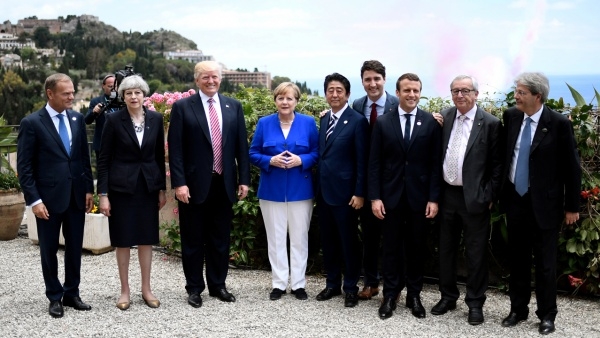Trump’s Invitation to Russia Disregards Georgia
The Group of Seven (G7) is an informal alliance of industrialized democracies. For some time the group was known as G8 as it grew to represent the world’s most powerful economies and Russia was added to the political forum in 1997.
The 44th annual summit was held between the seven G7 member states - Canada, France, Germany, Italy, Japan, the United Kingdom, the United States, and the representatives of the European Union - on June 8-9, 2018.
Russia participated in the forum for 16 years before its suspension after its annexation of Crimea in March 2014. The election of U.S. President Donald Trump in November 2016 ignited new tensions over coordinating economic, security, and energy policy, challenging the cohesion of global governance strategies. Namely, Trump would like to invite Russia back to the table.
Initially, the U.S. administration, then headed by President Bill Clinton, believed inviting Russia to join in 1997 would encourage the post-Soviet leader, Boris Yeltsin, to approach the ideals of developed democracies with greater optimism and compliance.
Current Russian President Vladimir Putin has a history of abusing his power and building an authoritarian regime, with nearly 20% of Georgian territory and the eastern provinces of Ukraine under de facto Russian control. Unfortunately a coherent geopolitical strategy was never developed to respond to the Russian military occupation after the 2008 Russo-Georgian War.
The United Nations Security Council passed a unanimous resolution in April 2008, stating: "the commitment of all Member States to the sovereignty, independence and territorial integrity of Georgia within its internationally recognised borders and supports all efforts by the United Nations and the Group of Friends of the Secretary-General, which are guided by their determination to promote a settlement of the Georgian-Abkhaz conflict only by peaceful means and within the framework of the Security Council resolutions."
Economic sanctions ensued after Russia continued to support separatist forces in Georgia and Ukraine. Isolating Russian oligarchs from international trade and financial markets is symbolic of a condemnation of Russia that will continue until it recognizes the sovereignty of territories like Abkhazia, Tskhinvali Region/South Ossetia, and Crimea.
Although Putin has been delegitimized as a member of the international order for ongoing violations of several countries’ territorial integrity, Trump does not recognize the current political situation. With his invitation to Putin, he expresses both ignorance and complacency in the face of lawlessness and damage to the international order.
Trump feels that Russia should be readmitted to this year’s forum, reasoning “You know, whether you like it or not - and it may not be politically correct - but we have a world to run and in the G7, which used to be the G8, they threw Russia out. They should let Russia come back” according to a quote reported by BBC news.
Other participants of the G7 bloc of developed democracies, traditional American allies, refuse to find logic in Trump’s invitation to Russia, and continue to demand progress in Russia before making considerations in its favor.
By Emily Sullivan












